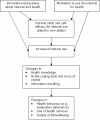Interventions for enhancing consumers' online health literacy
- PMID: 21678364
- PMCID: PMC6464831
- DOI: 10.1002/14651858.CD007092.pub2
Interventions for enhancing consumers' online health literacy
Abstract
Background: Access to health information is critical to enable consumers to participate in decisions on health. Increasingly, such information is accessed via the internet, but a number of barriers prevent consumers making effective use of it. These barriers include inadequate skills to search, evaluate and use the information. It has not yet been demonstrated whether training consumers to use the internet for health information can result in positive health outcomes.
Objectives: To assess the effects of interventions for enhancing consumers' online health literacy (skills to search, evaluate and use online health information).
Search strategy: We searched: the Cochrane Consumers and Communication Review Group Specialised Register; Cochrane Central Register of Controlled Trials (CENTRAL, The Cochrane Library, Issue 1 2008); MEDLINE (Ovid); EMBASE (Ovid); CINAHL (Dialog); ERIC (CSA Illumina); LISA (CSA Illumina); PsycINFO (Ovid); Index to scientific and technical proceedings; SIGLE; ASLIB Index to Theses; ProQuest Dissertation Abstracts; National Research Register/UK CRN Portfolio database; Current Controlled Trials - MetaRegister of Controlled Trials. We searched all databases for the period January 1990 to March 2008.
Selection criteria: Randomised controlled trials (RCTs), cluster RCTs and associated economic evaluations, quasi-RCTs, interrupted time series analyses, and controlled before and after (CBA) studies assessing interventions to enhance consumers' online health literacy, in any language.
Data collection and analysis: Two review authors independently selected studies for inclusion, assessed their quality and extracted data. We contacted study authors for clarification and to seek missing data. We presented results as a narrative and tabular summary, and calculated mean differences where appropriate.
Main results: We included two studies: one randomised controlled trial (RCT) and one controlled before and after (CBA) study with a combined total of 470 participants. The RCT compared internet health information classes with patient education classes for participants with HIV infection. Only the RCT, which we rated as having a moderate risk of bias, reported statistically significant positive effects for primary outcomes related to online health literacy in the intervention group, for the following outcomes: 'Self-efficacy for health information seeking', 'health information evaluation skills' and the 'number of times the patient discussed online information with a health provider'. The CBA, which we rated as having a high risk of bias, compared internet health information classes with a control group receiving no intervention among healthy adults aged 50+. It showed significant positive changes only in a secondary (behavioural) outcome in the intervention group, regarding the readiness to adopt the internet as a tool for preventive health information. No adverse effects were reported.There is low quality evidence that such interventions may improve some outcomes relevant to online health literacy in certain populations.
Authors' conclusions: Due to the small number of studies and their variable methodological quality, the evidence is too weak to draw any conclusions about implications for the design and delivery of interventions for online health literacy. There is a need for well-designed RCTs to investigate the effects of such interventions. These should involve different participants (in terms of disease status, age, socio-economic group and gender) to analyse the extent to which online health literacy reduces a barrier to using the internet for health information. Trials should be conducted in different settings and should examine interventions to enhance consumers' online health literacy (search, appraisal and use of online health information) like internet training courses, measuring outcomes up to at least one year after the intervention to estimate the sustainability of the intervention effects.
Conflict of interest statement
None known
Figures
















Update of
References
References to studies included in this review
-
- Cortner DM. Stages of Internet adoption in preventive health: an exploratory diffusion study of a community‐based learning venue for 50+ year old adults. PhD: Capella University, United States2006.
-
- Kalichman SC, Cherry C, Cain D, Pope H, Kalichman M, Eaton L, et al. Internet‐based health information consumer skills intervention for people living with HIV/AIDS. Journal of Consulting and Clinical Psychology 2006;74(3):545‐54. - PubMed
References to studies excluded from this review
-
- Eysenbach G. Impact of Internet instructions on men with prostate cancer. http://www.controlled‐trials.com/ISRCTN10001875/eysenbach (accessed 24 January 2008).
Additional references
-
- Aldridge F, Lavender P. The impact of learning on health. Leicester: NIACE, 2000:1‐33.
-
- Anderson‐Inman L, Horney MA. Transforming text for at‐risk readers. In: Reinking D, McKenna M, Labbo L, Kieffer R editor(s). Handbook of Literacy and Technology: Transformations in a Post‐Typographic World. Mahwah, NJ: Lawrence Erlbaum Associates, 1998:15‐44.
-
- Baker L, Wagner TH, Singer S, Bundorf MK. Use of the Internet and e‐mail for health care information: results from a national survey. JAMA 2003;289(18):2400‐6. - PubMed
-
- Benotsch EG, Kalichman S, Weinhardt LS. HIV‐AIDS patients' evaluation of health information on the Internet: the digital divide and vulnerability to fraudulent claims. Journal of Consulting and Clinical Psychology 2004;72(6):1004‐11. - PubMed
Publication types
MeSH terms
LinkOut - more resources
Full Text Sources
Medical
Miscellaneous

